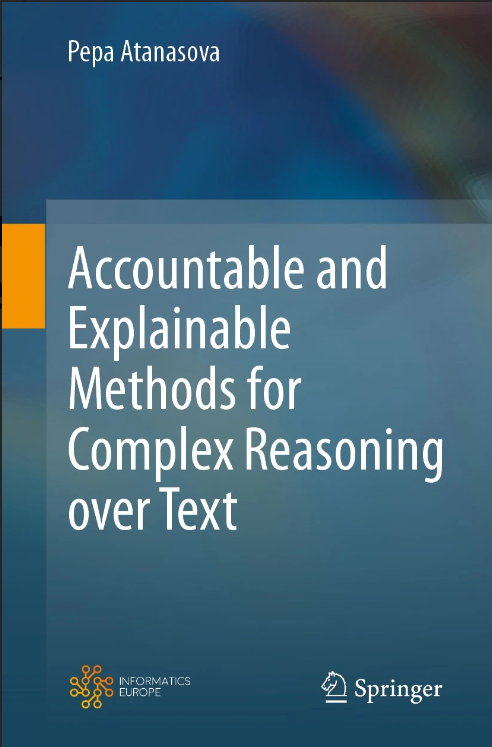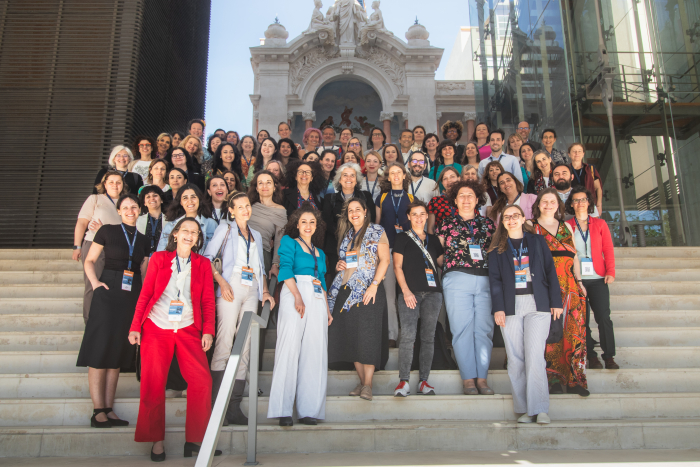|
Check out the highlights below and help us share them with the wider informatics community!
In this issue:
Apply for ECSS 2024’s Doctoral Symposium and Poster Session
As part of the ECSS 2024 program, a Doctoral Symposium (DS) and Poster Session will be hosted in the Early Career Researchers Workshop (ECRWS) on 28 October. Submissions are now open.
This year marks the debut of the Doctoral Symposium at ECRWS, where outstanding PhD students are invited to present their ongoing projects. The DS offers feedback from a panel of senior researchers and individual mentoring sessions, providing an excellent platform to exchange insights and expand your PhD support network. While the DS is exclusive to PhD students, we welcome all early career researchers to submit papers for presentation in the poster session during the cocktail event attended by all ECSS participants.
Full submission guidelines can be found here. Submit by 21 July for DS consideration and by 26 August for the poster session. Accepted papers will be considered for publication in the post-proceedings. We look forward to receiving your submissions.
***
ECSS 2024 is the flagship summit for the leadership of the Informatics research and education community in Europe. Workshops, organised by IE working groups and in collaboration with our member National Informatics Associations, will be devoted to crucial and timely strategic issues and trends regarding multiple aspects of informatics in Europe. Registration will open in June. Discover our preliminary program and session details here - see you in Malta!
IE’s Best Dissertation Award 2023 now published in dedicated Springer Series
The dissertation that won last year's Informatics Europe Best Dissertation Award (IEBDA) has been recently published by Springer.

The publication is a revised version of the PhD dissertation written by Pepa Atanasova, our BDA 2023 winner, to receive her PhD from the Faculty of Science, University of Copenhagen, Denmark. The dissertation presents research that facilitates the analysis of the reasons behind the outputs of machine learning models. With results applicable to complex reasoning tasks like fact-checking, question answering or natural language inference, the dissertation has been considered the most outstanding thesis in the field of informatics nominated for IEBDA 2023.
We invite your continued support in empowering emerging researchers within the IE community and beyond - nominate now for IEBDA 2024! You or your student could be the next winner of a EUR 3,000 prize sponsored by Springer, with an invitation to publish the awarded dissertation in a dedicated Springer series and present the work at ECSS 2024 in Malta, alongside informatics leaders from academia and industry! Submit nominations here by 1 June.
New report by IE’s Diversity and Inclusion Working Group
IE's Diversity and Inclusion Working Group (WG) is dedicated to promoting awareness and best practices in diversity through inclusion across Europe's informatics community. The WG conducted a mapping study from December 2022 to assess ongoing diversity initiatives and collect information from university departments developing such projects. This study aims to highlight key activities and guide the development of effective practices. The report, which is available here, summarises findings from 33 initiatives captured during this period. We welcome comments and feedback for the report.
To share new diversity and inclusion initiatives, please fill in the questionnaire here. The WG is preparing a public repository to disseminate these efforts.
Final EUGAIN conference in Lisbon and Gender Summit on 23 May
On 21-22 April, the COST Action European Network on Gender Balance in Informatics (EUGAIN) held its Management Committee Meeting and Final Conference in Lisbon, Portugal.

The Conference highlighted EUGAIN’s 3.5 years of efforts to improve gender balance in Informatics across Europe and beyond. More than 80 academics, researchers, industry representatives, and policymakers from over 30 countries gathered for interactive discussions on extending the impact of EUGAIN activities and achievements across Europe following the conclusion of the COST Action this October. The slides of the talks given during the Conference are available for download here. The results and best practices of the EUGAIN work can be found at https://eugain.eu/results/best-practices/.
Missed the final conference? Catch EUGAIN on May 23rd (16:45-17:59 CEST) at the Gender Summit 2024 where they will present their initiatives and results once more! Free streaming is available and all are welcome - register here.
IE is honoured to have served as an incubator for the project and supported it as the Grant Holder Manager. We extend heartfelt thanks to all EUGAIN members for their invaluable contribution and commitment!
Finally, don’t miss the Informatics Europe Minerva Informatics Equality Award 2024, another significant activity co-organised with EUGAIN. The Award celebrates successful initiatives that have had a measurable impact on women’s careers at all stages and carries a prize of EUR 5,000 sponsored by Google. Submit nominations here on or before June 1st. Previous nominators are encouraged to review their material and submit new nominations for this year's Award. Whether new or not, we look forward to your submissions!
Upcoming deadlines and activities
Explore our Open Activities webpage to learn how you can engage and benefit from our activities. Here are a couple of noteworthy highlights for you:
-
Interested in becoming an IE Board Director or nominating a colleague? Explore how in our call here. Nomination by May 20th for the 2025-2027 term.
-
Summer School on Informatics Education Research: Europe’s first and only, co-organised with IBM Research. Places are limited and applications are reviewed on a first-come-first-serve basis. Apply now by 30 Jun 2024 with a motivation letter and CV.
-
Join CV Repository for success and visibility: IE’s CV Repository is beneficial for both employers and job/internship seekers. Watch our short intro video, register for CV Repository now, and you might win one of three 100 EUR rewards via our lucky draw by joining and having your profile fully uploaded as an Applicant on the Repository from May to July 2024. Winners will be notified directly by us.
Events by IE members
IE member news
Quantum Computing: UnitaryFund Awards Marco Venere a Research Grant - Politecnico di Milano
Marco Venere, a student in the Ph.D. program in Information Technology at the Department of Electronics, Information and Bioengineering, has won a research grant funded by UnitaryFund, a non-profit organization that aims to support the quantum technologies ecosystem for the benefit of the research community. The funded project is about integrating error mitigation techniques within an open-source framework for QAOA, a well-known quantum algorithm aimed at solving optimization problems. Read the full story here.
Boost for autonomous systems research at SnT - University of Luxembourg
The University’s Interdisciplinary Centre for Security, Reliability and Trust (SnT) has secured the support of the Luxembourg National Research Fund (FNR) to spearhead a cutting-edge research programme, titled “Autonomous systems for Land, Air and Space” (ATLAS).
The funding will support multiple research projects, each run by a PhD student who will be immersed in both the industrial setting of the respective partner and the academic environment of SnT, with a strong collaboration between all parties involved. “Through an open, interdisciplinary approach, we want to cultivate a fertile ground for innovative ideas and start-ups,” said Prof. Raphaël Frank, Head of UBIX Research Group at SnT and principal investigator. Read here for more details.
AI composes personalized sound to help you fall asleep - University of Stuttgart
Researchers from the fields of musicology, neuroscience, psychology, and computer science from nine European universities are leveraging AI to investigate the most effective methods for aiding sleep. Together they examine acoustic stimuli with different frequencies, from white to pink to brown noise. The latter sounds like rustling leaves or heavy rain. Or even artificially generated melodies and rhythms, such as those used in a sleep study as part of Lullabyte, an EU doctoral network which attaches great importance to promoting young talent.
"The main aim is to teach an AI system to optimize acoustic stimuli based on my reaction to what I hear, so that they help me fall asleep in the best possible way," explains Pflüger. This requires machine learning methods that teach AI exactly that. Pflüger, a computer scientist from Stuttgart, is working on this together with his doctoral students Samuel Morgan and Jonathan Stumber. Read the full coverage here.
***
Would you like to share the latest updates about your institute with fellow IE members and professionals in informatics and related fields? Simply email the relevant news in brief to our Communication Specialist Kit Wan Chui to get featured in our Bulletin, LinkedIn and X.
|
|


